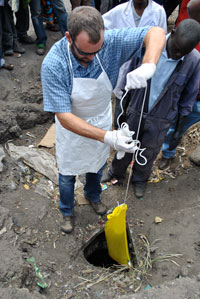
The University of Washington School of Public Health and PATH, a leading international health organization, received an initial $2.4 million grant from the Paul G. Allen Family Foundation to help develop and introduce new tools to help detect the polio virus.
The tools – a system to improve environmental surveillance and a simplified diagnostic test – have the potential to help workers identify and stop polio by making it easier to find the virus in sewage and among people. UW researchers, with support from Seattle-based PATH through the Bill & Melinda Gates Foundation, have been developing a bag-mediated filtration system that allows workers to sample and filter greater amounts of fluid from waste or standing water.
"Everyone wants to increase the amount of surveillance to pin down where transmission is occurring," says Dr. Scott Meschke, associate professor of environmental and occupational health sciences in the School of Public Health. "If a bottleneck in the laboratory is hindering those efforts, then that's a real problem. That's a key rationale behind this project: to minimize the bottleneck."
PATH, meanwhile, is developing a simplified diagnostic tool to quickly identify the virus in individuals. It can be used in local laboratories without complex equipment. The grant announcement comes at a time of heightened awareness about the spread of polio. In early May, the World Health Organization declared polio a Public Health Emergency of International Concern, citing the spread of the virus from Pakistan, Syria and Cameroon.
More information: http://www.path.org/news/press-room/682/
